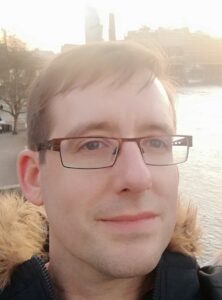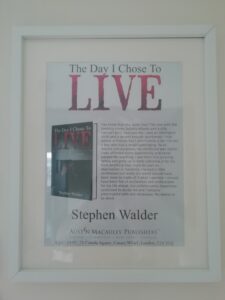**Please note some readers may find the following content upsetting or triggering. Barod also does not take responsibility for some terms and language used, as these are the words of the author**
I didn’t choose to become an alcoholic. I never made a conscious decision to become an addict. It just sort of happened. During my four-year involvement with Barod, two as a service user in Swansea and now two as an employee with DDAS in Carmarthenshire, I don’t think that I have met someone who had less reason to take this path, but it still happened.
Alcoholic and addict are terms that I have never used to describe myself yet could easily have been attributed to me by others. After over four years of sobriety, with one solitary use of cocaine in the six months prior to that, I don’t believe that these words bear any resemblance to where I am in my life now.
I was clearly in denial about the scale of my issues with alcohol and drugs, to the point where it wasn’t until six months into my recovery, while preparing for a talk at a rehab facility, when a 100,000-word autobiography spilled out of me, that I was actually able to admit that my main reason for living over the previous twenty years had been to consume alcohol. I typed the following words before I fully comprehended what I was admitting to myself:
“Looking back now, I can see that it was around this time that a drink stopped being a reward for a day’s work. A day’s work became the justification for a drink or a session. I have been deluding myself for years, and it is only writing this now that I realise that my main reason for getting out of bed in the morning, since I was 20, has been to have a drink. Shit!”
The reasons behind my descent seem to stem from a lack of self-esteem and confidence and I found solace in alcohol, both as a reward system and as a source of brief respite from how I was feeling. As I slid further into depression and despondency, cocaine became the only way to get any positive feeling into my mind and my body. I took many other stimulants and empathogens, but it was cocaine that I took to. It is probably easy to look at this and say that this explains my twenty-five plus year struggle with anxiety and depression and nine suicide attempts. This has been a view taken by many a medical or mental health professional over the years. Unfortunately, I was experiencing very strong suicidal ideation and impulse by the age of ten or eleven, years before I ever used alcohol or any other drug. My alcohol and drug use doesn’t explain why I would spend time at that age on railway bridges urging myself to pluck up the courage to throw myself under the wheels of an approaching train. It seems to me that there is a perception that alcohol and drug use is always the cause of mental ill health, rather than ever being an attempt to self-manage it.

Stephen now works for Dyfed Drug and Alcohol Service (DDAS) as an Active Treatment Worker.
Now, it is fair to say that my mental health has improved no end since I stopped drinking and using cocaine, but that could be down to several factors. Firstly, was the intervention of a GP who was prepared to believe that, although alcohol and drugs exacerbated my poor mental health, they were not the root cause. This was the first step in my recovery, even though I attempted suicide two days later. Her acceptance that my substance use was a symptom, rather than the cause, was crucial. Following that subsequent suicide attempt, and another self-harm binge, her repeated recommendation that I engage with a substance use service was acknowledged and I self-referred. I began attending SMART Recovery meetings at Barod in Swansea, 2 or 3 per week, and started attending groups with Swansea Mind. I was engaging with several hours of group therapy per week and receiving guidance that allowed me to slowly make changes to the way that I lived and thought. With this in mind, and my pre-drug history of mental turmoil, it would be simplistic to say that the removal of alcohol and drugs from my life led to my improvement. It was key but it was just one part of the changes that I made.
Everyone’s story of how they became embroiled in a battle with alcohol, or another substance, is entirely unique to them. There are recurring and common themes, but everyone’s experiences are unique. The same can be said about how people find recovery, it is a very individual journey, but it doesn’t need to be travelled alone. It is helped hugely by meeting people with that shared experience. Recovery is personal and it is up to the individual concerned to define their recovery and the way that they pursue that. What is crucial, is choice.
I mentioned earlier about how I have never used the words alcoholic or addict to describe myself. My wife, on the other hand, will continue to refer to herself as an addict when she attends the meetings that have helped her so much. She by no means defines herself as such. There is so much more to her, and I am glad to say that she fully acknowledges and appreciates this. The terms, or labels, as some people may refer to them, serve many purposes. For some, they are akin to a diagnosis, providing insight into a condition that will need to be continually managed. For many, it guards against complacency. It is easy to forget how unmanageable and miserable life became, especially when you are moving on with your life, having made those positive changes. Regularly referring to yourself in this way can keep you grounded and mindful of how things can quickly turn.
 Stephen’s autobiography, ‘The Day I Chose to Live’ was published in May 2021.
Stephen’s autobiography, ‘The Day I Chose to Live’ was published in May 2021.
The most important person in the fellowship meetings of groups following the 12-step approach, is the newcomer. The newcomer is a reminder of how unmanageable and difficult life can become. When I was a newcomer to SMART Recovery, I took some comfort in people who were further along the road of recovery than I was, because I entered those meetings without hope. People who had once been where I was and were now maintaining positive changes, were an inspiration and a source of hope for me. I hope that I was able to be the same for newcomers as I progressed to become a peer facilitator for SMART.
This is why the 12-step fellowship approach works well for so many people, especially those who have completed their step work. Having never engaged with this myself, I am unable to comment with any authority, but I am fully aware of how this can transform people’s lives and know many people who have completely turned their lives around, through this. It is the undeniable success of this model for so many that makes the lack of funding for 12-step rehab in Wales seem like a glaring omission in service provision. Like I said, there is no one size fits all approach to recovery, be it from substance use or mental health, and that is why choice is so important. The meeting rooms provide the continuing aftercare and community that is so crucial to a successful recovery.
My wife and I have both taken different routes to recovery, but both find ourselves in a position where we finally feel comfortable with who we are and are now living a life of contentment together. My refusal to categorise myself as an alcoholic or an addict, and her continued use of that term, has no bearing on our marriage and our ability to support each other, as we look to grow in our recovery, both as individuals, and as a couple. We see no need to try to persuade each other and just appreciate that we have both found a way to manage conditions that have blighted our lives. What we choose to call ourselves, or how we choose to refer to ourselves, is entirely our own business. What is important is that we do not let others define us with labels to suit their views. Recovery is individual and personal and should be entirely on your own terms.
Stephen Walder was born in Bromley, Kent in 1981 and lived there until he moved to Swansea in 2006. Following many years suffering with his mental health and substance use issues, Stephen referred into Barod in Swansea in July 2018, and it was here that he would meet Cath in a SMART Recovery meeting in December 2018. The two were to marry in August 2021. Stephen became a Barod employee in September 2020 when he was appointed to the role of Active Treatment Worker with Dyfed Drug and Alcohol Service. In May 2021, Stephen’s autobiography, The Day I Chose to Live was published and is available to buy at: https://www.austinmacauley.com/book/day-i-chose-live

